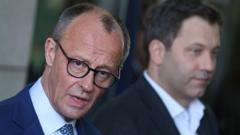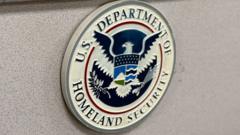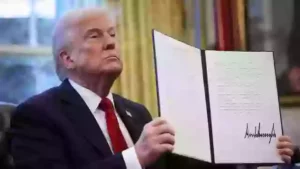In a significant development, Friedrich Merz's Christian Democrats have formed a coalition with the Social Democrats, ending a political stalemate that lasted nearly five months. The agreement emphasizes strong governance and aims to address pressing issues such as economic instability and migration controls.
New Coalition Secures Germany’s Leadership After Political Deadlock

New Coalition Secures Germany’s Leadership After Political Deadlock
A coalition between Friedrich Merz's conservatives and the Social Democrats aims to restore stability in Germany following months of uncertainty.
Germany’s political arena has seen a notable shift as Friedrich Merz, leader of the Christian Democratic Union (CDU), announced a coalition with the Social Democrats, bringing an end to a prolonged governmental impasse that lasted five months following the collapse of the previous administration.
At 69 years old, Merz highlighted the urgency behind the agreement, asserting it delivers “a strong and clear signal” to both Germans and EU partners that the nation is ready for robust governance. This coalition emerges at a time when Germany faces economic challenges exacerbated by global trade tensions and rising support for the far-right Alternative for Germany (AfD), which has recently outperformed Merz’s party in opinion polls.
Despite being the apparent victor in the February federal elections, Merz's party has struggled against the backdrop of political uncertainty. However, with a majority of 13 seats anticipated in the next parliamentary session, he is poised to become Chancellor, pending the chamber's formal vote next month.
In announcing the coalition’s objectives, Merz conveyed that they had dedicated significant effort over previous weeks to craft a viable plan for governance, claiming, “we have a strong plan to bring our country to the forefront again.” Key proposals within the agreement include reforms to Germany's fiscal policies, aimed at enabling substantial investments in infrastructure and military capabilities.
Additionally, the coalition has committed to implementing measures targeting irregular migration and enhancing border controls, reflecting a significant concern that influenced the recent election’s voter sentiment. Merz expressed confidence in securing party approvals for the coalition, with plans to begin governance by early May.
Meanwhile, a recent Ipsos poll indicates the CDU's support at 24%, just trailing behind the AfD, whose co-leader Alice Weidel has declared that the current political landscape is set for transformation. As Germany steps into this new chapter, the effectiveness of the coalition's strategies will be closely observed amid growing political fervor in the country.




















